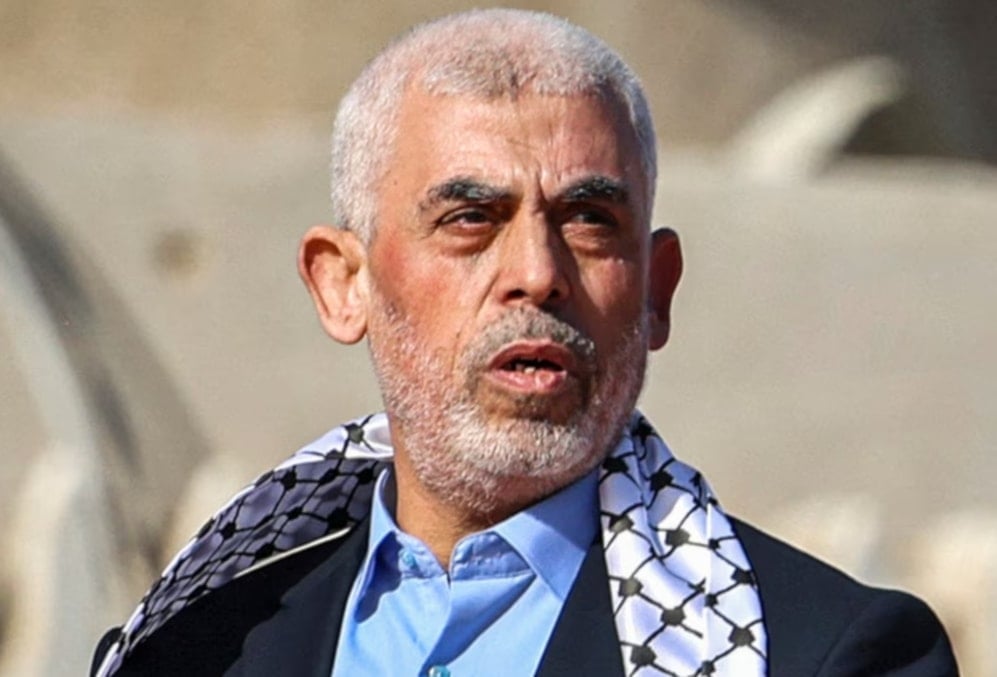US-Israeli intelligence outmatched by Sinwar's defiance: Reports
Sinwar’s martyrdom underscores the failure of the US and Israeli intelligence to fully grasp his unwavering ideology and fortifies his reputation as a legendary figure in the struggle.
-

Martyr Yahya Sinwar appears before supporters in 2022 during a rally marking the 35th anniversary of Hamas' foundation in Gaza City. (Undated, AFP)
International media remain stunned by the revelation that Sinwar was killed in battle, actively fighting despite the yearlong, intense efforts by US and Israeli intelligence to assassinate him.
His death not only highlights the failure of these agencies to fully comprehend his ideology but also cements his status as a legendary figure, whose determination and resistance persisted to the very end. Sinwar's legacy now resonates even more powerfully, symbolizing the resolve of a man who defied immense pressure and became a martyr in his struggle.
CNN said that Sinwar's death concludes a "yearlong manhunt" that engaged both Israeli and US intelligence services. The CIA had even established a dedicated task force to track Sinwar, and after the events of October 7, the US increased its intelligence resources in the region to focus on Hamas and its leadership, as per the report.
However, several US officials said, as quoted by CNN, that his death came as an unexpected event.
For months, both Israeli and US intelligence had a rough idea of Sinwar's general location, it added.
Still, the Hamas leader's constant movement made it extremely challenging to precisely track him down.
Until the end, US intelligence officials believed as cited by the report that Sinwar was indifferent to his own survival and resolutely committed to continuing the fight.
Sinwar’s final moments: Defiant Resistance fighter
The operation to capture Sinwar, as per The New York Times, included Israeli commandos and intelligence agents, along with a dedicated unit set up within Shin Bet's headquarters and the CIA. The effort employed advanced electronic surveillance tools and ground-penetrating radar technology supplied by the United States.
In a related context, Daniel Byman, a professor at Georgetown University’s School of Foreign Service, has recently said that the killing of Yahya Sinwar, the recently elected head of Hamas' political bureau, may turn out to be less impactful than anticipated in the current war on Gaza.
While Sinwar's death only means one less leader in the Palestinian Resistance, Hamas is far from rescinded as "Israel" faces the more complex challenge of the day after in Gaza.
Byman wrote in Foreign Policy that despite Hamas suffering the loss of many of its leaders like Ismail Haniyeh and [allegedly] Mohammed Deif, the Resistance will still have new less-experienced members ready to take over.
Sinwar's death might increase the likelihood of a ceasefire, Byman argues, since he was more aggressive toward "Israel" and his strategy was to allow the occupation to continuously harm its worldwide reputation and its relationship with the US.
According to Byman, the savage Israeli assault on Gaza is a cautionary tale for future leaders in the Resistance about the dangers of confronting a ruthless adversary, noting that Hamas may find it advantageous to regroup and rebuild, despite the occupation claiming it killed a third of its fighters as it killed 42,000 Palestinians.
On the other hand, new leaders may also choose to intensify their resistance efforts. Under Sinwar, Hamas significantly harmed "Israel", revitalized the Palestinian cause, and tarnished "Israel’s" global image.
Following the loss of numerous leaders, fighters, and countless Palestinian lives, there is also a strong desire for revenge among the Resistance and its members.
Read more: Hamas built underground war machine for survival: WashPo
Despite Israeli bloodthirst, Byman asserts that "Hamas endures" as a Resistance movement and has recovered from the assassination of its leaders in the past, while Benjamin Netanyahu continues to ignore the pleas of Israelis for a captive agreement.

 4 Min Read
4 Min Read








